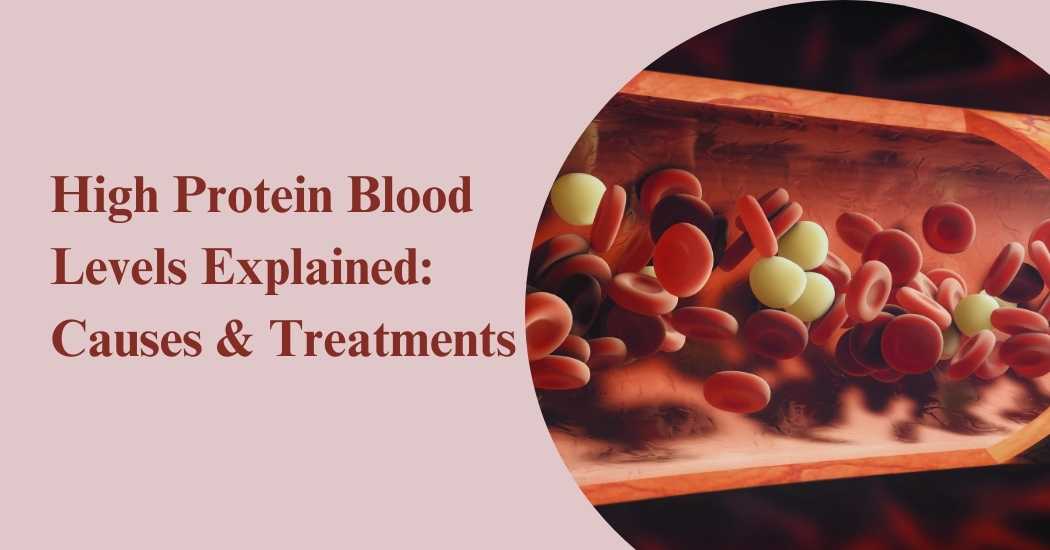
In the realm of health, high protein levels in the blood can signal various underlying issues, prompting concern and the need for further investigation. While protein is essential for bodily functions, elevated levels can sometimes indicate an imbalance or an underlying health condition. This article delves into the intricacies of high protein blood levels, exploring their causes, symptoms, and available treatments.
What are High Protein Blood Levels?
Proteins are vital molecules responsible for numerous functions within the body, including building and repairing tissues, supporting immune function, and serving as enzymes and hormones. Under normal circumstances, protein levels in the blood remain within a specific range. However, elevated levels, known as hyperproteinemia, can occur due to various factors.
Causes of High Protein Blood Levels
1. Dehydration
Dehydration is one of the common causes of high protein levels in the blood. When the body loses fluids without adequate replenishment, the concentration of proteins in the blood increases. This elevation in protein levels is primarily due to the reduced volume of blood plasma.
2. Chronic Inflammation
Chronic inflammatory conditions, such as rheumatoid arthritis or inflammatory bowel disease, can lead to elevated protein levels. Inflammation triggers the release of certain proteins, including C-reactive protein (CRP), which can increase overall protein levels in the bloodstream.
3. Multiple Myeloma
Multiple myeloma is a type of cancer that affects plasma cells, which are responsible for producing antibodies. In this condition, abnormal plasma cells proliferate uncontrollably, leading to the overproduction of certain proteins, particularly immunoglobulins, resulting in high protein levels in the blood.
4. Liver Disease
Liver diseases, such as cirrhosis or hepatitis, can disrupt normal protein metabolism and synthesis, leading to elevated protein levels in the blood. The liver plays a crucial role in producing proteins, including albumin and globulins. Any impairment in liver function can result in increased protein levels.
5. Kidney Disorders
Kidney disorders, such as nephrotic syndrome or glomerulonephritis, can cause proteinuria, the presence of excess protein in the urine. When the kidneys fail to filter proteins efficiently, they may leak into the bloodstream, leading to high protein levels.
Symptoms of High Protein Blood Levels
The symptoms associated with high protein blood levels can vary depending on the underlying cause. However, some common signs may include:
- Edema (swelling)
- Fatigue
- Nausea
- Loss of appetite
- Jaundice (in liver-related conditions)
- Bone pain (in multiple myeloma)
It is essential to consult a healthcare professional if you experience persistent symptoms or suspect elevated protein levels in your blood.
Diagnosis and Treatment
Diagnosing high protein blood levels typically involves a combination of medical history review, physical examination, and laboratory tests. Blood tests, including total protein and albumin levels, can help assess protein levels in the bloodstream.
Treatment for high protein blood levels focuses on addressing the underlying cause. Depending on the diagnosis, treatment options may include:
- Hydration therapy for dehydration
- Anti-inflammatory medications for chronic inflammation
- Chemotherapy, radiation therapy, or targeted therapy for multiple myeloma
- Management of underlying liver or kidney disorders
In some cases, dietary modifications or lifestyle changes may also be recommended to support overall health and well-being.
Conclusion
High protein blood levels can stem from various underlying causes, ranging from dehydration to serious medical conditions like multiple myeloma or liver disease. Understanding the potential causes and symptoms of elevated protein levels is crucial for timely diagnosis and appropriate management. If you suspect high protein levels in your blood or experience concerning symptoms, it is essential to seek medical attention promptly. Early detection and intervention can help prevent complications and promote better health outcomes in the long run.
FAQ’s (Frequently Asked Questions)
High protein blood levels, also known as hyperproteinemia, refer to elevated levels of proteins in the bloodstream. These proteins can include albumin, globulins, and other protein molecules.
Several factors can lead to high protein blood levels, including dehydration, chronic inflammation, conditions like multiple myeloma or liver disease, and kidney disorders such as nephrotic syndrome.
Symptoms may vary depending on the underlying cause but can include swelling (edema), fatigue, nausea, loss of appetite, jaundice (in liver-related conditions), and bone pain (in multiple myeloma).
Diagnosis typically involves a medical history review, physical examination, and blood tests to measure total protein and albumin levels. Additional tests may be necessary to identify the underlying cause.
Treatment focuses on addressing the underlying cause. This may include hydration therapy for dehydration, anti-inflammatory medications for chronic inflammation, chemotherapy or targeted therapy for conditions like multiple myeloma, and management of liver or kidney disorders. Lifestyle changes and dietary modifications may also be recommended.
Seeking medical attention is crucial for timely diagnosis and appropriate management. Early detection can help prevent complications and promote better health outcomes in the long run.
Yes, in some cases, lifestyle changes such as maintaining hydration, following a balanced diet, and avoiding excessive alcohol consumption can support overall health and may help in managing high protein blood levels, especially when associated with dehydration or liver and kidney disorders.












